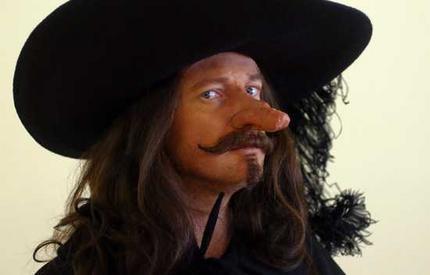Using drama with high school English students
“A great nose may be an index of a great soul.”
~Cyrano de Bergerac by Edmond Rostand
If I referenced a play with an iconic balcony scene, a love triangle, and a main character’s death, most would assume I meant Romeo and Juliet. However, these elements also characterize the rousing drama, Cyrano de Bergerac by Edmond Rostand.
This play takes its name from the main character, a nobleman serving in the French Army. But Cyrano is more than just a soldier. He is also a duelist, a musician, and a poet with a biting wit, courageous heart, and noble mind.
A man of integrity, Cyrano stands against the corrupt society of 1640’s France. He is a prolific writer and makes many enemies as he ridicules the shallow and confronts the bullies—even the rich and powerful—with his words. When the men who believe their value comes from how they dress and what they own belittle him, he asserts that though his outward appearance may be threadbare, he wears his adornments on his soul.
“I have a different idea of elegance. I don’t dress like a fop, it’s true, but my moral grooming is impeccable. I never appear in public with a soiled conscience, a tarnished honor, threadbare scruples, or an insult that I haven’t washed away. I’m always immaculately clean, adorned with independence and frankness.
I may not cut a stylish figure, but I hold my soul erect. I wear my deeds as ribbons, my wit is sharper then the finest mustache, and when I walk among men I make truths ring like spurs.”
During a time when most artists kowtow to patrons to finance their art, Cyrano remains fiercely independent. He chooses to be penniless and free rather than give control of his life to another.
“To sing, to laugh, to dream, to walk in my own way and be alone, free, with an eye to see things as they are, a voice that means manhood—to cock my hat where I choose—at a word, a Yes, a No, to fight—or write. To travel any road under the sun, under the stars, nor doubt if fame or fortune lie beyond the bourne—never to make a line I have not heard in my own heart.”
Cyrano fights for right and to protect his friends. Even when the battle seems futile, he defies the odds. He has only one area of weakness—he believes his unusually large nose makes him ugly and that the woman he adores, Roxane, could never return his love. So in matters of the heart he is a coward and never tells her.
When Cyrano discovers that Roxane cares for a handsome, young cadet named Christian, he despairs. Then Christian confesses that he is hopeless with words, and Cyrano hatches a plan. He will write words of love for Christian to speak to Roxane. Together he and Christian will become one perfect romantic hero.
In a poignant yet hilarious scene, Cyrano stands below Roxane’s balcony, disguised by darkness, and helps Christian win a kiss from her. Christian climbs on Cyrano’s shoulders to reach Roxane, a visual representation of the play’s central problem.
This drama highlights the disparity between inner and outer beauty and explores the elements of true beauty. These are timely questions to discuss with young people growing up in a culture that venerates youth and physical perfection.
As a plus, the play contains more than enough adventure and humor to keep the most reluctant English students engaged.
For this unit, I assign parts to my students, and we begin by reading the play aloud. After we read each act, I show that same act from a version of the play that stars Kevin Kline and Jennifer Garner. (Please note that this version contains half a scene which I skip due to crude jokes not in the original.)
Renee Ann Smith teaches literature in a Christian high school by day and writes stories by night. She reviews books and shares inspirational posts on her blog Doorkeeper at http://reneeannsmith.com/. You can also find her on Twitter at https://twitter.com/ReneeAnnSmith.
Resource List:
Cyrano de Bergerac, Amazon Instant Video

